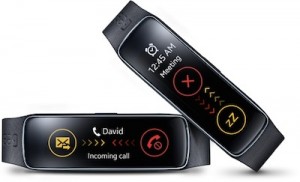 Samsung's Gear Fit.
Samsung's Gear Fit.
With the Apple Watch launch, and its potential to upend the wearables market, a few months away, Canalys reports that the current market leader for "smart wearable bands" -- any wristworn device that can run third-party applications -- is Samsung. Meanwhile, the "basic wearable band" market, which Canalys defines as wearables that can't run apps, is still led by Fitbit.
The up-and-comer in the non-smartwatch wearable market is Xiaomi, whose focus on the Chinese market and low price point have catapulted it into the spotlight. It has shipped more than a million Mi Bands, 103,000 of those on the first day.
"Though the Mi Band is a lower-margin product than competing devices, Xiaomi entered the wearables market with a unique strategy, and its shipment volumes show how quickly a company can become a major force in a segment based solely on the size of the Chinese market," analyst Jason Low said in a statement.
Canalys didn't share the total shipment numbers for basic bands, but said 4.6 million smart bands shipped in 2014, only 720,000 of which were Android Wear. Of those, Motorola led the market with its Moto 360. Samsung led the smart band segment overall, owing to the wide range of devices the company has available.
"‘Samsung has launched six devices in just 14 months, on different platforms and still leads the smart band market," VP and principal analyst Chris Jones said in a statement. "But it has struggled to keep consumers engaged and must work hard to attract developers while it focuses on [operating system] Tizen for its wearables."
Canalys predicts Apple's entry into the market will blow up the category, and says the device's battery life will be the main advantage over Android Wear to begin with.
"Apple made the right decisions with its WatchKit software development kit to maximize battery life for the platform, and the Apple Watch will offer leading energy efficiency," analyst Daniel Matte said in a statement. "Android Wear will need to improve significantly in the future, and we believe it will do so."














